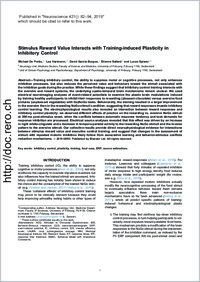Stimulus reward value interacts with training-induced plasticity in inhibitory control
- De Pretto, Michael Neurology Unit, Medicine Section, Faculty of Science and Medicine, University of Fribourg, Switzerland
- Hartmann, Lea Neurology Unit, Medicine Section, Faculty of Science and Medicine, University of Fribourg, Switzerland
- Garcia-Burgos, David Unit of Clinical Psychology and Psychotherapy, Department of Psychology, University of Fribourg, Switzerland
- Sallard, Etienne Neurology Unit, Medicine Section, Faculty of Science and Medicine, University of Fribourg, Switzerland
- Spierer, Lucas Neurology Unit, Medicine Section, Faculty of Science and Medicine, University of Fribourg, Switzerland
-
21.11.2019
Published in:
- Neuroscience. - 2019, vol. 421, p. 82–94
English
Training inhibitory control, the ability to suppress motor or cognitive processes, not only enhances inhibition processes, but also reduces the perceived value and behaviors toward the stimuli associated with the inhibition goals during the practice. While these findings suggest that inhibitory control training interacts with the aversive and reward systems, the underlying spatio-temporal brain mechanisms remain unclear. We used electrical neuroimaging analyses of event-related potentials to examine the plastic brain modulations induced by training healthy participants to inhibit their responses to rewarding (pleasant chocolate) versus aversive food pictures (unpleasant vegetables) with Go/NoGo tasks. Behaviorally, the training resulted in a larger improvement in the aversive than in the rewarding NoGo stimuli condition, suggesting that reward responses impede inhibitory control learning. The electrophysiological results also revealed an interaction between reward responses and inhibitory control plasticity: we observed different effects of practice on the rewarding vs. aversive NoGo stimuli at 200 ms post-stimulus onset, when the conflicts between automatic response tendency and task demands for response inhibition are processed. Electrical source analyses revealed that this effect was driven by an increase in right orbito-cingulate and a decrease in temporo-parietal activity to the rewarding NoGo stimuli and the reverse pattern to the aversive stimuli. Our collective results provide direct neurophysiological evidence for interactions between stimulus reward value and executive control training, and suggest that changes in the assessment of stimuli with repeated motoric inhibition likely follow from associative learning and behavior-stimulus conflicts reduction mechanisms.
- Faculty
- Faculté des sciences et de médecine
- Department
- Médecine 3ème année
- Language
-
- English
- Classification
- Biological sciences
- License
- License undefined
- Identifiers
-
- RERO DOC 327726
- DOI 10.1016/j.neuroscience.2019.10.010
- Persistent URL
- https://folia.unifr.ch/unifr/documents/308386
Statistics
Document views: 71
File downloads:
- spi_srv.pdf: 226
